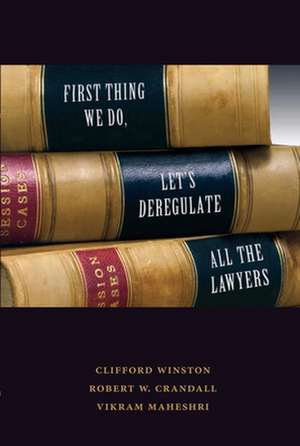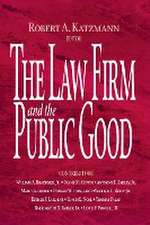First Thing We Do, Let's Deregulate All the Lawyers
Autor Clifford Winston, Robert W. Crandall, Vikram Maheshrien Limba Engleză Paperback – 11 aug 2011
Not many Americans think of the legal profession as a monopoly, but it is. Abraham Lincoln, who practiced law for nearly twenty-five years, would likely not have been allowed to practice today. Without a law degree from an American Bar Association–sanctioned institution, a would-be lawyer is allowed to practice law in only a few states. ABA regulations also prevent even licensed lawyers who work for firms that are not owned and managed by lawyers from providing legal services. At the same time, a slate of government policies has increased the demand for lawyers' services. Basic economics suggests that those entry barriers and restrictions combined with government-induced demand for lawyers will continue to drive the price of legal services even higher.
Clifford Winston, Robert Crandall, and Vikram Maheshri argue that these increased costs cannot be economically justified. They create significant social costs, hamper innovation, misallocate the nation's labor resources, and create socially perverse incentives. In the end, attorneys support inefficient policies that preserve and enhance their own wealth, to the detriment of the general population.
To fix this situation, the authors propose a novel solution: deregulation of the legal profession. Lowering the barriers to entry will force lawyers to compete more intensely with each other and to face competition from nonlawyers and firms that are not owned and managed by lawyers. The book provides a much-needed analysis of why legal costs are so high and how they can be reduced without sacrificing the quality of legal services.
Clifford Winston, Robert Crandall, and Vikram Maheshri argue that these increased costs cannot be economically justified. They create significant social costs, hamper innovation, misallocate the nation's labor resources, and create socially perverse incentives. In the end, attorneys support inefficient policies that preserve and enhance their own wealth, to the detriment of the general population.
To fix this situation, the authors propose a novel solution: deregulation of the legal profession. Lowering the barriers to entry will force lawyers to compete more intensely with each other and to face competition from nonlawyers and firms that are not owned and managed by lawyers. The book provides a much-needed analysis of why legal costs are so high and how they can be reduced without sacrificing the quality of legal services.
Preț: 206.90 lei
Nou
Puncte Express: 310
Preț estimativ în valută:
39.60€ • 41.19$ • 33.19£
39.60€ • 41.19$ • 33.19£
Carte tipărită la comandă
Livrare economică 13-27 martie
Preluare comenzi: 021 569.72.76
Specificații
ISBN-13: 9780815721901
ISBN-10: 0815721900
Pagini: 110
Ilustrații: Illustrations
Dimensiuni: 152 x 229 x 13 mm
Greutate: 0.18 kg
Ediția:New.
Editura: Brookings Institution Press
Colecția Brookings Institution Press
ISBN-10: 0815721900
Pagini: 110
Ilustrații: Illustrations
Dimensiuni: 152 x 229 x 13 mm
Greutate: 0.18 kg
Ediția:New.
Editura: Brookings Institution Press
Colecția Brookings Institution Press
Notă biografică
Clifford Winston is a senior fellow in the Brookings Institution Economic Studies program. Robert W. Crandall is a nonresident senior fellow in Economic Studies at Brookings. Vikram Maheshri is an assistant professor at the University of Houston.
Descriere
Not many Americans think of the legal profession as a monopoly, but it is. Abraham Lincoln, who practiced law for nearly twenty-five years, would likely not have been allowed to practice today. Without a law degree from an American Bar Association–sanctioned institution, a would-be lawyer is allowed to practice law in only a few states. ABA regulations also prevent even licensed lawyers who work for firms that are not owned and managed by lawyers from providing legal services. At the same time, a slate of government policies has increased the demand for lawyers' services. Basic economics suggests that those entry barriers and restrictions combined with government-induced demand for lawyers will continue to drive the price of legal services even higher.
Clifford Winston, Robert Crandall, and Vikram Maheshri argue that these increased costs cannot be economically justified. They create significant social costs, hamper innovation, misallocate the nation's labor resources, and create socially perverse incentives. In the end, attorneys support inefficient policies that preserve and enhance their own wealth, to the detriment of the general population.
To fix this situation, the authors propose a novel solution: deregulation of the legal profession. Lowering the barriers to entry will force lawyers to compete more intensely with each other and to face competition from nonlawyers and firms that are not owned and managed by lawyers. The book provides a much-needed analysis of why legal costs are so high and how they can be reduced without sacrificing the quality of legal services.
Clifford Winston, Robert Crandall, and Vikram Maheshri argue that these increased costs cannot be economically justified. They create significant social costs, hamper innovation, misallocate the nation's labor resources, and create socially perverse incentives. In the end, attorneys support inefficient policies that preserve and enhance their own wealth, to the detriment of the general population.
To fix this situation, the authors propose a novel solution: deregulation of the legal profession. Lowering the barriers to entry will force lawyers to compete more intensely with each other and to face competition from nonlawyers and firms that are not owned and managed by lawyers. The book provides a much-needed analysis of why legal costs are so high and how they can be reduced without sacrificing the quality of legal services.










